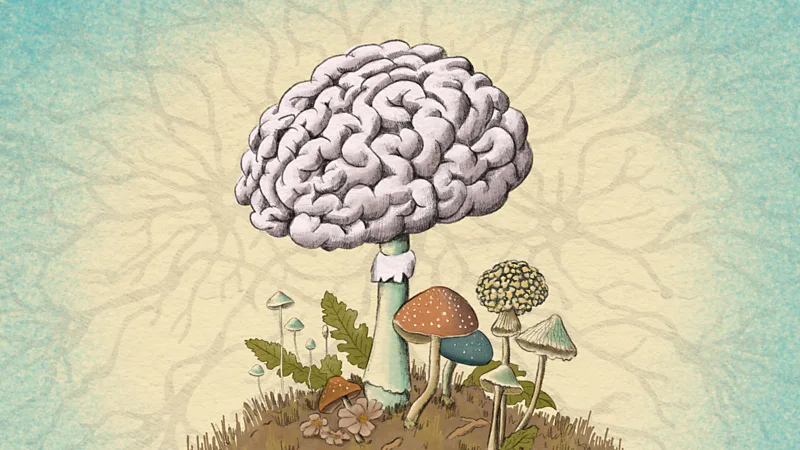Our body is a mosaic of fungi. Some scientists think they could be influencing our brain
The fungi within our bodies may have a much greater effect on our health than we've long given them credit for.

Amongst the millions of tiny life forms living on and inside our bodies are countless species of fungi. Our skin is a mosaic of them, membranes inside the nose and vagina are full of them, and fungi even live alongside the bacteria inside our guts.
While we might acquire some fungi from our mothers at birth, new fungi are also constantly entering our bodies; we ingest yeasts every time we drink beer or eat bread, and we inhale floating fungal spores with every breath. Many of these fungi are quickly killed off by our immune systems, but others are transient passengers or lifelong acquaintances.
Lately, scientists have been exploring how our fungal inhabitants could even influence our brains, minds and behaviour.
Doctors have long known that fungi can cause dangerous brain infections. But researchers are now also finding curious – albeit sometimes controversial – hints that these microbes might have other neurological effects on humans.
The idea might evoke images of the human-zombifying fungus from HBO's apocalyptic series The Last of Us. But while scientists agree that the idea of fungi taking complete control over our bodies is implausible, they're earnestly investigating whether some fungi inside us could contribute to brain-damaging diseases, or if gut-dwelling fungi could influence our behaviour and mental health.
Much more research is needed, experts say. But these possibilities are important to study – both to understand the deep and complex relationships with the microbes within us and to explore new ways of boosting our health.
In general, humans are pretty good at resisting fungi (our warm body temperature tends to make it hard for them to take hold). And many of the fungi that do might actually be good for us, possibly supporting our immune systems or helping wounds to heal, says microbiologist Matthew Olm of the University of Colorado Boulder, US. "I would say fungi are definitely a critical part of being a healthy human," he says.
But many other fungi can cause infections, from athlete's foot to thrush. This happens when we encounter new, harmful fungi in our environment or when fungi that naturally coexist with us are under certain conditions triggered to explode in abundance, says Rebecca Drummond, a fungal immunologist at the University of Birmingham, UK.
It's rare for fungi to reach the brain, thanks to protective barriers in the lungs and intestines, along with the brain's own defensive wall, the blood-brain barrier, and immune cells that are primed to destroy any fungi that slip through. But fungal brain infections do happen, and the number of cases has increased in recent decades.
This is due to a growing number of people with weakened immune systems, Drummond says, partly because of the global spread of the immune-crippling virus HIV, especially in parts of Africa but also due to rising use of immune-suppressing medications in cancer patients and organ transplant recipients. "The more of these immune-modulating drugs we use, we'll see more of these fungal infections," Drummond says.
Fungi that infect the brain sometimes originate in the lungs, including Aspergillus or Cryptococcus, which we inhale as airborne spores that can germinate, grow and spread if left unchecked, Drummond says. Less often, common gut residents such as Candida albicans grow out of control and, once in the brain, branches out and produces nerve-killing toxins, Drummond adds. Cryptococcus, meanwhile, can grow into tumour-like masses. "Obviously, that causes huge amounts of damage," she says.
Fungal brain infections are often fatal, with Aspergillus reaching mortality rates of above 90%. They can be tricky to treat, says Drummond: there aren't many antifungal medications, and not all drugs get across the blood-brain barrier to kill off brain-dwelling fungi. Some fungi have also already developed resistance to these drugs.
People who survive fungal infections of the brain are often left with long-term brain damage. Aids patients who have survived cryptococcal meningitis, which arises from a brain infection by Cryptococcus x, suffer vision impairments, memory loss and dizziness, says Drummond.
Scientists have long known of the dangers of fungal brain infections. But in recent years, some have been exploring the possibility that fungi are getting into the brain much more frequently than previously believed, and may even be contributing to the loss of nerve cells that occurs in conditions like Alzheimer's disease.
To Richard Lathe, a molecular biologist at the University of Edinburgh, UK, some of the most interesting evidence for this theory comes from a handful of cases where fungal and other microbial brain infections were coincidentally discovered in people initially diagnosed with Alzheimer's disease. In several cases where doctors prescribed infection-fighting medication, "the symptoms of dementia remitted", Lathe says. "Quite remarkably, some of them went back to work".
Lathe believes that microbes slip across the blood-brain barrier quite frequently but are usually suppressed or killed in people with healthy immune systems. Because our immune systems weaken with age, that could allow microbes to accumulate in the brain, perhaps triggering nerve-killing inflammation. "It's only when the immune system declines that you see damage," he says.
Scientists are investigating whether fungi could be involved in mental disorders
Scientists have long linked Alzheimer's to a build-up of certain proteins in the brain, but there's now a growing debate over whether the presence of those proteins is the cause or merely a symptom of the disease. Lathe argues these proteins are actually produced as a defence mechanism against microbial intrusion, based on research suggesting the proteins have infection-fighting properties.
Further evidence that brain-intruding microbes could be causing Alzheimer's comes from experiments in mice, where scientists have witnessed the fungus Candida albicans entering the brain after the rodents' immune systems were compromised. And in one pre-print study – which hasn't yet been peer-reviewed by other scientists – Lathe and his colleagues examined brain slices from deceased healthy people and Alzheimer's patients. They found large quantities of bacteria, viruses and fungi in both groups – but more in the brains from patients who had Alzheimer's.
If microbes are indeed a factor in Alzheimer's, we may be able to mitigate or even prevent the disease by strengthening people's immune defences, for instance with vaccines that have been shown to boost general immunity. But this theory is young, Lathe says. "It's a new idea."
And a debated one, too. Olm and others argue it's hard to rule out that the microbial genetic material may have appeared because of contamination, as fragments of microbes tend to be ubiquitous. Lathe finds that unlikely, though, pointing to reports that microbe fragments in brain tissue are just as abundant inside the samples as they are on the surface, whereas contamination from the air would mostly settle on the brain surface.
Still, Olm says that finding more microbe fragments in Alzheimer's brains isn't proof that those microbes cause the disease. For instance, those people's brains might simply have had a weaker blood-brain barrier or some other issue, meaning more microbes entered their brains over time before being killed off by their immune systems.
However, new evidence that microbes can invade the brains of animals like fish strengthens the notion that this could be happening in mammals – and perhaps even humans, Olm says. In a 2024 study, scientists labelled bacteria with tiny, fluorescent green molecules and added them to tanks housing salmon and trout. "After a week, you see these microbes making their way into the fish brain, lighting the fish brain up green," Olm says, and curiously, "[the microbes] seemingly live there without huge consequences for these fish over their lifetime."
In any case, the notion of fungi and other microbes getting into the brain in old age – either due to a weakening brain immune system or a worn-out blood brain barrier – is more plausible. "I think we've now reached that threshold where there's enough smoke around this hypothesis… it's worth spending money on figuring out if that is happening," Olm says.
Interestingly, fungi might not need to enter the brain in order to influence it.
In a 2022 study, immunologist Iliyan Iliev of Weill Cornell Medicine in the US and colleagues found that adding Candida albicans to the guts of mice made them more resilient to damage of their gut linings caused by bacterial infections or heavy antibiotic use. Strengthening the gut wall may be a defence mechanism by the body to prevent the fungus and other microbes from escaping the gut and infecting other tissues, Iliev says.
But the big surprise came when the team observed the rodents' behaviour. Remarkably, fungi-colonised mice were much more likely to sniff, communicate and engage with other mice – meaning that exposure to the fungi appeared to have some sort of behavioural effect too. Based on other experiments, the scientists theorise that certain molecules released by the mice's immune cells enter the bloodstream and somehow stimulate certain nerve cells in the brain that are involved in behaviour. "It was very surprising to us," Iliev recalls.
It's a mystery why, at least in mice, this crosstalk between gut fungi and the brain exists. Is it a coincidence that fungus-triggered immune signals affect the brain, or "is that actually deliberately done by the fungus to benefit its survival?" Iliev asks. Perhaps mammalian bodies somehow benefit from changing their behaviour in response to fungi, Iliev speculates.
There's no evidence yet that this crosstalk between gut fungi and the brain happens in humans, but the possibility would be worth investigating, Olm says. In recent years, evidence has mounted that gut-dwelling bacteria may be able to send signals to the brain via the immune and nervous systems, or by producing substances associated with the symptoms of depression, anxiety, and relaxation. In principle, Olm says, "there's no reason to think that fungi aren't doing this as well". (Read more about how gut bacteria could be influencing the brain).
Some scientists are even investigating whether fungi could be involved in mental disorders. Several studies have found differences in the makeup of gut fungi in people who suffer from depression or bipolar disorder.
In women with schizophrenia, those who showed signs of exposure to the gut-dwelling Candida albicans tended to score lower on tests of memory and other cognitive abilities, according to a 2016 study by Johns Hopkins neuroscientist Emily Severance and her colleagues. She is exploring the possibility that Candida overgrowth – caused by stress or antibiotics, for instance – provokes an imbalance of gut microbes, altering the substances they produce in ways that make susceptible people more likely to develop schizophrenia. If true, it could allow doctors to treat schizophrenia symptoms by giving people probiotics that help reverse the overabundance of Candida – which would in any case be helpful, she says.
But finding an association doesn't mean that the fungi cause schizophrenia. It could simply be that these patients are somehow more prone to high levels of Candida. So far "we can only come up with associations", says Severance. “I think that that's typical for a field of study that is very exciting – but still very early on in the timeline.”
Which of our fungal inhabitants – if any at all – are really influencing our brains is something scientists hope to learn in the coming years. "[Fungi are] definitely important," Drummond says, "but exactly how they're important, I think, is still being worked out." One thing is already clear: while bacteria have long been in the limelight, it may be time we also pay serious attention to the fungi quietly shaping our health from within.
-BBC







